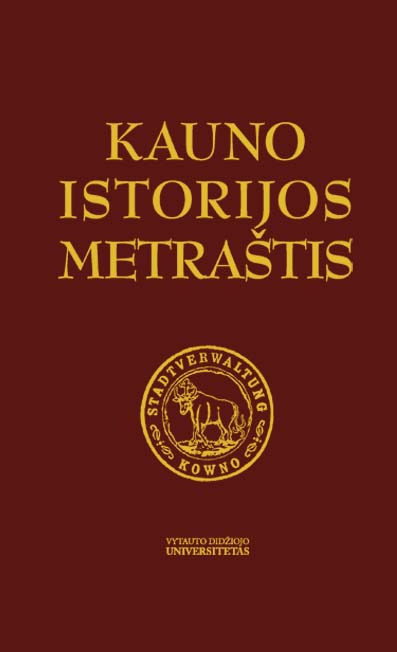Vytauto Didžiojo karo muziejus nacių okupacijos metais 1941–1944 m.
Vytautas the Great War Museum During the Nazi Occupation (1941–1944)
Author(s): Aušra JurevičiūtėSubject(s): History, Cultural history, Museology & Heritage Studies, Military history, WW II and following years (1940 - 1949)
Published by: Vytauto Didžiojo Universitetas
Keywords: Occupation; The Soviets; The Nazis; The destruction of tradition; Brig. Gen. Vladas Nagevičius;
Summary/Abstract: The activity of Vytautas the Great War Museum during the period of the Nazi occupation between June 22, 1941 and the end of July, 1944 has not been studied by historians yet. During the three-year occupation, the museum experienced many disturbances, shocks and losses. The people who worked there had to eliminate the legacy of the previous Soviet occupation as well as to resist the requirements of the new occupiers with the view to preserve the exhibits invaluable and dear to the Lithuanian nation. At that moment, the museum staff managed to arrange The Red Terror department to reflect the effects of the Soviet occupation on Lithuania and its people. During the scrap-metal campaign, the museum lost several valuable exhibits, including “The School of Misery” by Petras Rimša, Napoleon cannon, the bust of the poet Stanislovas Dagilis, “The Knight”, a sculpture by Juozas Mikėnas placed in the tower of the museum, the prizes to Lithuanian aviation, a large brass plaque “A Dying Pilot” from the Aviation Department, and other minor items. The Nazis tried hard to use the exhibitions and the sacral area of the museum for their propaganda. They organized farewell banquets for those joining the Reich Labour Service, the days of Wehrmacht, and etc. However, Vladas Nagevičius, the retired Brigadier General, managed to continue and foster the Lithuanian interwar traditions in the museum and in the outside garden, such as All Souls’ Day, the commemoration of the death of Darius and Girėnas, or burying bodies of outstanding people in Vytautas the Great chapel. In 1943, an important event for Lithuania, the Lithuanian Conference, was held in the museum. As a result of the Soviet occupation in June 15, 1940, other important dates were commemorated during the entire period of the Nazi occupation, i.e. June 14, the Mourning Day of the first deportations of Lithuanian citizens, and June 22, the liberation day from the Bolsheviks. Throughout all the complicated period, Vytautas the Great War Museum remained the venue to gather people and to commemorate the tragic historical events of the nation, to consolidate common efforts to resist requirements of the occupiers or to quietly celebrate February 16. Only the diplomacy and private contacts of Vladas Nagevičius, the retired Brigadier General, and dedication of the museum staff managed to save the museum and most of its exhibits.
Journal: Kauno istorijos metraštis
- Issue Year: 2016
- Issue No: 16
- Page Range: 167-194
- Page Count: 28
- Language: Lithuanian

